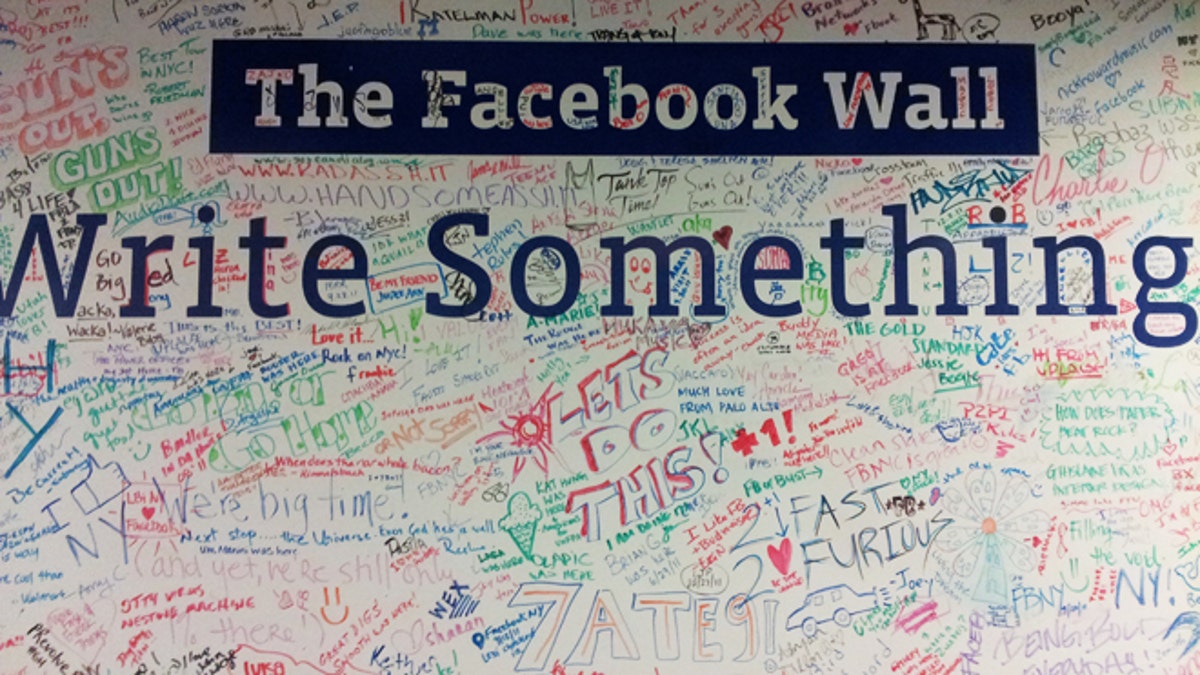
The Facebook Wall -- not the virtual one, but a real wall, at the company's New York offices. (FoxNews.com / Jeremy A. Kaplan)
Facebook has been in the news a lot recently. Mark Zuckerberg bought the What's App company in February for a staggering, mind-blowing, huge – I'm running out of adjectives here – $19 billion. Last week, the company bought a little-known virtual-reality headset maker for $2 billion.
Those high-profile deals shouldn't distract us from the fact that Facebook's main business is selling advertising based on the mountains of information it's got on its user base. And when I say "user base," I mean me and you!
The targeting practices going on behind the scenes are both deep and complex. We the consumers have to stay on our toes to protect ourselves. It's sad to say, but a lot of privacy violations occur just because people don't know how to protect themselves.
These are great tips for you -- and for your family. If there are kids in the house, make sure they understand the importance of these privacy protections early. And if there are less tech-savvy folks around, go over these tips with them, too.
So let's get started.
First, you need to clear out your Facebook search history. Yes, it keeps track of all your searches. That's the reality of the world we're living in.
On your Facebook home page, click the down arrow in the upper right-hand corner, and select Activity Log. In the left-hand column where it lists Photos, Likes and Comments, click the More button below those. Then at the bottom of the list click Search.
Once you've clicked on that, you'll be able to see everything – and everyone – you've search for on the site. (It's kind of disturbing!) Up at the top of the page, click on Clear Searches, and then again in the dialog box to confirm.
The search area should now be empty. You can't turn this feature off, however, so you will have to come back and do this regularly.
Did you know Facebook's Graph Search system can expose your past posts to everyone? Learn how to keep strangers out of your posts.
Second, you want to make sure Facebook won't use your picture to endorse or sell products. Believe it or not, Facebook's terms of service allow your image to be automatically used if you've said you "liked" a particular product, or "checked in" at a particular store or restaurant.
To stop this, let's go back to the Activity Log page and, again on the left-hand side, click on the Likes link. You'll see all your likes listed.
It's smart to go down the list looking for companies that might advertise on Facebook. If you see one, go to the little pencil icon on the right, click on it, and select Unlike. Learn more settings to stop Facebook from using your name and face in ads.
Third, we need to dive into privacy settings. We all have to take responsibility for our online privacy.
I liken Facebook posts to a sign in front of your house. You think you live on a cul de sac, and the fact that the sign says, "Hey, we're on vacation," or "Hey, my daughter June just got an after-school job at the local Applebee's" really isn't that big of a deal.
We have to realize that with the wrong settings you're living on Main Street, and just about anyone can see your Facebook posts. Learn four ways burglars use what you post on social media to target you.
So go to the padlock icon in the upper right corner of your profile and under "Who can see my stuff?" set "Who can see my future posts?" to Friends. And if you're been loose about friending everyone who asks, you might think about weeding out your friends list.
You can also create a custom list of "Close Friends" - click here to learn how - and set your posts to be visible only to that list. The option to select a list is in the same place you select Friends.
Fourth, I have a tip for parents. Facebook originally didn't let the Facebook pages for kids be viewable by the general public – just their friends. That's changed. If your kids are minors, it's a good idea to go in and adjust their privacy settings to make sure they are set to "Friends."
You should also go to the down arrow in the upper corner, select Settings and in the left-hand column choose Privacy. Then click the Limit Past Posts link and set that to Friends as well.
And finally, this is a tiny bit sobering, but if Facebook and your Facebook profile is a big part of your life, you should start thinking about what you want to happen if you were to pass away.
Facebook rules decree that the status of your page will remain the way you had it in life; it will be "memorialized," as the company puts it, when they are presented with evidence of your passing. Click here to read more on Facebook's death procedures.
Copyright 2014, WestStar MultiMedia Entertainment. All rights reserved.
On the Kim Komando Show, the nation's largest weekend radio talk show, Kim takes calls and dispenses advice on today's digital lifestyle, from smartphones and tablets to online privacy and data hacks. For her daily tips, newsletters and more, visit her website at http://www.komando.com.








































